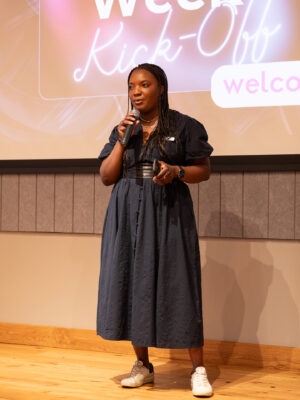
If the 21st century is the century of women and girls, as the United Nations declared in 2011, then it may particularly be the century of women and girls of color – who have long faced the double prejudice of racism and sexism. And that’s not just because Vice President Kamala Harris has become the first woman of color to secure a major political party’s nomination for the presidency of the United States.
Recently, the “PBS News Hour” profiled Fawn Weaver, whose seven-year-old Uncle Nearest Premium Whiskey – named for African American master distiller Nearest Green, a former slave who created the method of distilling Tennessee whiskey that would become Jack Daniel’s – is the most successful Black-owned liquor company to date, worth more than $1 billion and run by an all-women executive team.
But not every budding entrepreneur is Weaver. In 2018, Marie Rocha, a software engineer turned venture capitalist, created Stamford-based Realist Ventures “to address the funding gap for women and Black entrepreneurs.” Along the way, she saw that aspiring entrepreneurs often lacked not only the funding but the know-how to fulfill their business dreams. That’s why in 2022 she began Realist Lab, offering what she called a kind of “mini MBA” through six-to-12-week programs “that teach every aspect of start-ups from how to pitch to the fundamentals of running a start-up, go-to-market strategies, branding and fundraising.”
The programs culminate in Demonstration Days (pitch events) that come with monetary awards, with Realist Lab awarding a minimum of $80,000 a year. To date, it has graduated 61 start-ups from its programs.
“We’re building founders so they can build their businesses,” Chief Marketing Officer Isis-Rae Goulbourne said of the lab, which over five years has received $5 million from the Connecticut Department of Economic and Community Development and $1 million from the U.S. Economic Development Administration (EDA), the latter through a partnership with The Community Foundation of Greater New Haven.
For those who have already launched businesses, there is the Moves Forward Grant program, which Rocha said has aided LGBTQ+, military-veteran, Black and women entrepreneurs especially, with “up to $5,000 to help make investments (marketing, legal, tech) to grow their start-ups.
But Realist Lab goes beyond these programs to connect with entrepreneurs, Goulbourne said, encouraging more than 360 companies to date with HelpFest and Perfect Pitch. In HelpFest, which will be held monthly throughout the state this fall, business owners receive one-on-one mentorship from experts. (Realist Lab also has open office hours on Fridays.) Perfect Pitch lets start-up founders make their business pitches to professionals in free virtual sessions. The upcoming dates are Sept. 17, Oct. 22 and Nov. 19.
Realist Lab will also hold Room for All, a large-scale networking event, Sept. 18 at The Palms, Stamford, and a Start-Up Sanctuary that marries wellness and entrepreneurship Oct. 4 at Grace Farms in New Canaan. Fall will also see a push for donors, the launch of a new website and the lab’s first fundraiser on Nov. 7.
Next year marks the return of one of its most ambitious projects, CT Tech Week, to be held once again in the first week of June.
The inaugural two-day conference, which drew more than 300 people to 12 events on June 5 and 6, brought together such area power players as Bullish Capital; GE Appliances, CoCreate, a Haier company; the Connecticut Department of Economic and Community Development; Heather Gaudio Fine Art; NBC Studios; the city of Stamford; The Stamford Partnership; and The Village Foundation.
But Rocha, a New Jersey native (she attended New Jersey State University) who moved to Stamford more than 14 years ago and “fell in love with the place,” has bigger plans for Tech Week:
“I’d love to have it across the state.”






















